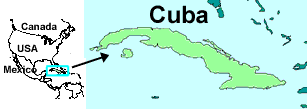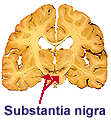 | Does Fidel Castro Have Parkinson's Disease? |
 November 21, 2005
November 21, 2005The Miami Herald, Associated Press and other news agencies have reported that the Central Intelligence Agency (CIA) believes that Cuban President Fidel Castro has Parkinson's disease. Castro's slow, stiff movements led the CIA to conclude that Castro has Parkinson's disease.
Cuban officials deny that Castro has any health problems. Castro's slow, stiff movements may just be signs of old age or from the effects of a broken knee and arm he suffered in a fall last year. Regardless of the controversial diagnosis of Parkinson's disease, Castro's health will be watched carefully by people around the world. |
|
Further information about Parkinson's disease::
|
| BACK TO: | Neuroscience In the News | Table of Contents |
![[email]](./gif/menue.gif) Send E-mail |
 Fill out survey |
 Get Newsletter |
 Search Pages |
 Parkinson's disease afflicts approximately 1 million
to 1.5 million people in the U.S., most of whom are 60 years old or older.
The disorder is seen in people of all ethnic groups and among men and
women in equal numbers. There is no known cause and no cure, just
treatments to help control the symptoms of trembling arms and legs,
trouble speaking, and difficulty coordinating movement. Parkinson's
disease occurs when neurons degenerate (lose the ability to function
normally) in a part of the brain called the substantia nigra. Many of the
neurons that degenerate contain the neurotransmitter called dopamine. As
these neurons degenerate, dopamine levels fall, and the balance between
dopamine and other neurotransmitters, such as acetylcholine, is thrown
off. This neurotransmitter imbalance leads to movement problems.
Parkinson's disease afflicts approximately 1 million
to 1.5 million people in the U.S., most of whom are 60 years old or older.
The disorder is seen in people of all ethnic groups and among men and
women in equal numbers. There is no known cause and no cure, just
treatments to help control the symptoms of trembling arms and legs,
trouble speaking, and difficulty coordinating movement. Parkinson's
disease occurs when neurons degenerate (lose the ability to function
normally) in a part of the brain called the substantia nigra. Many of the
neurons that degenerate contain the neurotransmitter called dopamine. As
these neurons degenerate, dopamine levels fall, and the balance between
dopamine and other neurotransmitters, such as acetylcholine, is thrown
off. This neurotransmitter imbalance leads to movement problems.